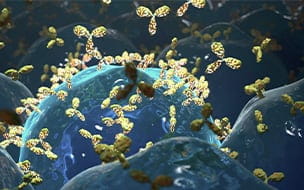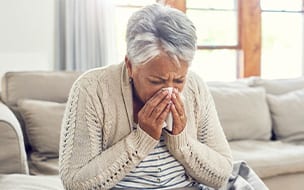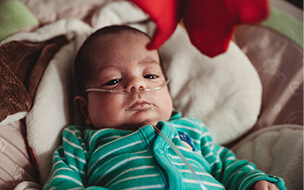RSV Symptoms, Treatment and Vaccinations
Respiratory syncytial virus, or RSV, is a common respiratory virus that circulates during the fall and winter months every year in the U.S. While RSV can affect people of all ages, it can be especially dangerous for infants and older adults. An RSV vaccine is now available that can significantly reduce the risk of severe infection and hospitalization for vulnerable populations.
What Should I Know About RSV?
Learn More About RSV
What Is RSV?
RSV is a viral infection that affects the respiratory system, including the nose, throat and lungs. The symptoms of RSV, which can include coughing, wheezing and runny nose, can be difficult to distinguish from those of the common cold, influenza, COVID-19 and other respiratory viruses.
RSV is spread through contact with the virus, such as through droplets from another person’s sneeze or cough or from touching a surface with the virus on it and then touching your nose, eyes or mouth.
RSV typically circulates through the fall and winter months in the U.S., peaking in December and January.
Most people get RSV for the first time as an infant or toddler, and most children will get it before their second birthday. Repeat infections are common throughout a person’s lifetime.
RSV in Infants and Children
Each year, up to 80,000 children under 5 require hospitalization due to RSV. Infants under 12 months, especially those younger than 6 months, are at a higher risk for severe RSV. Other risk factors in children include:
- Born prematurely
- Chronic lung disease
- Congenital heart disease
- A weakened immune system
- Severe cystic fibrosis
- Disorders that cause difficulty with swallowing
When to Seek Medical Help
When RSV spreads to the lower respiratory tract it can cause severe complications such as pneumonia or bronchiolitis. Bronchiolitis is the inflammation of the bronchioles, or the smallest airways in the lungs, and is more common in children under 2 years old. The swelling and mucus that clogs the airways can make it hard to breathe.
If your child has any of the following symptoms, you should contact their healthcare provider:
- High fever
- Labored breathing
- Wheezing
- Signs of dehydration or fewer wet diapers than usual
- Excessive drowsiness
- Bluish-colored lips or fingernails
When an infant or child is hospitalized with RSV, they may require treatment such as oxygen, IV fluids and/or mechanical ventilation to assist with breathing. Children generally improve within a few days under medical care and can be sent home.
RSV in Adults
Most healthy adults with RSV experience only mild symptoms that don’t require medical treatment or hospitalization. However, certain individuals are at a higher risk of developing severe RSV. According to the CDC’s estimate, RSV causes up to 160,000 hospitalizations and up to 10,000 deaths annually among adults ages 65 and older. Risk factors include:
- Age: Adults ages 75 and older are at an increased risk of severe RSV.
- Chronic conditions: This includes adults with chronic heart or lung disease.
- Weakened immune system: Certain medical conditions or medications can weaken the immune system and put individuals at an increased risk of severe RSV.
- Underlying medical conditions: These can include conditions such as diabetes or obesity.
- Living in nursing homes: RSV and other illnesses can spread rapidly in group living facilities like nursing homes, and the elderly and medically frail are more susceptible to severe illness.
The CDC recommends an RSV vaccine if you are ages 75 or older or if you are ages 60–74 and are at increased risk for severe RSV.
RSV Symptoms
Symptoms of RSV can be very similar to those of the common cold and other respiratory viruses. They include:
- Congestion
- Cough
- Fatigue
- Fever
- Headache
- Poor appetite
- Runny nose
- Sneezing
- Sore throat
- Wheezing
Young infants under 6 months old may experience symptoms such as:
- Fussiness/irritability
- Decreased activity
- Breathing pattern changes, including pauses in breathing (apnea)
Severe Symptoms
When RSV spreads to the lower respiratory tract it can cause more severe symptoms that may require hospitalization. These include:
- Bronchiolitis (inflammation of the small airways in the lung).
- Pneumonia.
- Acute bronchitis.
- Difficulty breathing.
- Low oxygen levels.
- Worsening of symptoms associated with conditions such as asthma, chronic pulmonary obstructive disorder (COPD) and congestive heart failure.
- Can lead to cardiac disease, bacterial infections and death.
Vaccines & Vaccination Options
There are now several FDA-approved options to help protect the most vulnerable populations from RSV. This includes a single-dose RSV vaccine recommended by the CDC for adults over age 75, high-risk individuals ages 60–74, and pregnant women, as well as an RSV antibody shot available for infants.
Centers for Disease Control and Prevention (CDC) Recommendations
Pregnant women: The RSV vaccine is recommended for women who are between 32- and 36-weeks gestation if their baby will be born during the RSV season (fall and winter). This single-dose maternal vaccination (Abrysvo) can provide infants with 6 months of protection from severe RSV infection.
Though pregnant women are not at an increased risk for severe RSV disease, the vaccine can pass on important protection to their unborn babies.
Infants: A shot that contains RSV antibodies (Beyfortus) can be given to babies, which will protect them against the illness for several months. It is recommended for babies younger than 8 months and should be administered just before or during the RSV season. It can also be given to babies between 8 and 19 months old during their second RSV season if they are considered high risk.
Most infants will not need to receive an antibody treatment if their mother received an RSV vaccine during pregnancy unless the baby is born less than 2 weeks after the RSV vaccine was administered.
Adults over age 60: The CDC recommends an RSV vaccine to everyone ages 75 and older and for adults ages 60–74 who are an increased risk of severe RSV illness. There are currently three RSV vaccines FDA approved for adults over age 60: Abrysvo, Arexvy and mResvia. You can receive your single-dose RSV vaccine at any time of the year, though it’s best to receive it in late summer/early fall before the RSV season begins.
These RSV vaccines are a single dose and currently do not need to be repeated annually.
RSV vaccines are available in adult and pediatric primary care offices, as well as retail pharmacies.
UH Primary Care
UH Rainbow Pediatricians
UH Retail Pharmacies
What Vaccines Should I Get?
In addition to the RSV vaccine, there are other recommended vaccinations that can help keep you healthy throughout your life.
Treatment Options
While most healthy people will recover within a week or two, RSV can become more serious, especially in young infants and children, older adults and people with chronic heart and lung conditions.
Managing RSV Symptoms at Home
When symptoms of RSV are mild, they can usually be managed at home until the virus runs its course. You may find relief by using over-the-counter pain relievers/fever reducers such as acetaminophen or ibuprofen and drinking plenty of fluids to prevent dehydration. Always follow the dosing instructions carefully when taking medications or giving them to your child. Never give aspirin to infants, children or teens, as it has been linked to Reye’s syndrome, a rare but serious condition.
Hospitalization for RSV
In the most severe cases, a person may require hospitalization. In the hospital the patient may require:
- Supplemental oxygen
- Intravenous (IV) fluids to combat dehydration
- Mechanical ventilation
In most cases, a hospital stay for RSV will last only a few days before the patient is discharged.





